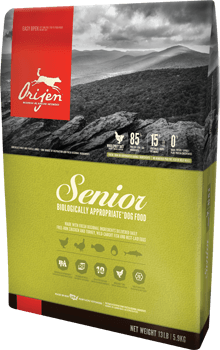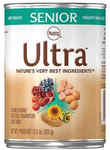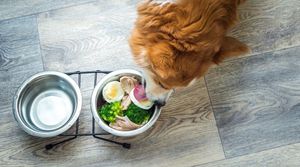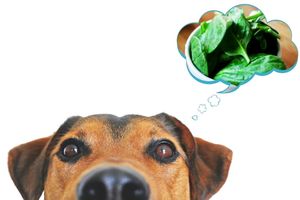Many pet parents struggle with the idea that their dog is aging and headed towards the designation of 'senior dog' As their dogs are such close companions in most cases - truly members of the family - the thought of them 'slowing down', becoming ill and eventually not being around at all can be very hard to bear.
The fact is though that aging is inevitable for everyone and the shorter lifespan of furkids is one of the downsides perhaps of being a pet parent, but the ultimate responsibility for any pet owner is to recognize when their once lively young pup is heading into their senior years and to ensure that those golden years are as healthy and happy as possible.
Quick Comparison
Best Dog Food for Senior Dogs
When is a Dog Considered Senior?
As the expected lifespan of various dog breeds can be different, just when is an adult dog old enough to be considered a senior and given more 'senior considerations'?
The problem with trying to put a human age on a dog is that dogs simply do not age in the same way as we do. You may have heard (often) that 'one dog year is equal to seven human years'. This old adage is one that is very commonly used but is not really scientifically very accurate.
As smaller breed dogs do tend to live longer than large breed dogs a small dog like a Yorkie may not be considered a senior until they are nine or so.
As a general rule, here is what expert literature indicates what age is considered senior based on breed size:
- Small dogs: when they reach 11 -12 years old.
- Medium dogs: when they reach 10 years old.
- Large dogs: when they reach 7 years old.
What Are the Signs of Aging in a Dog?
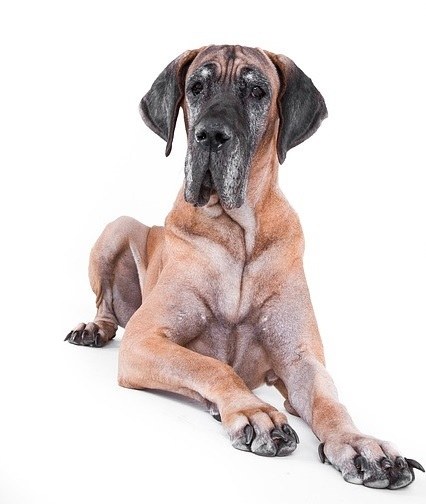
An aging, Great Dane.
With this in mind here is a look at some of the most common signs of aging in a dog that pet parents should be 'on the lookout' for.
A General Slow Down
Older dogs often have less endurance when out walking - their old routes may just be a little too far these days - or less enthusiasm for chasing everything they see at the dog park.
They may also be a little slower - and later - getting out of bed, a little less steady on the stairs and they may not quite have the same enthusiasm for certain toys anymore.
Some older dogs also exhibit behavior changes that are generally a result of the aging process.
An older dog who once had lots of patience for their fur - or human 'siblings' may display a lot less. They may not be quite as responsive to requests from their pet parents and some may appear a little lost or disorientated.
While some of these things are simply age related they may also be the symptom of an underlying disease or health condition.
There are a number of health conditions that 'come with age' for some dogs that pet parents should know to watch out including osteoarthritis, vision problems, liver and kidney problems.
Canine Osteoarthritis
Canine osteoarthritis is a degenerative joint disease that is similar to the osteoarthritis seen in older humans as well.
It can affect almost any joint in the body and occurs as the protective cartilage in the joints, that is designed to prevent bones' rubbing together' begins to thin and eventually deteriorate, leading to the bones doing exactly what they are not supposed to; grind against one another and begin to wear down as well.
This condition cannot be completely reversed once it has set in but with an arthritis friendly diet, lifestyle changes and appropriate pain management its effects can be lessened and an affected pup can still lead a very happy life.
Vision Problems
Various vision problems are common in older dogs as well.
Cataracts, glaucoma, retinal degeneration and similar conditions are all seen in older dogs, with some breeds being more genetically predisposed to develop them than others.
Again, these diseases may often not be completely reversible but early and consistent care, diet changes and lifestyle management can help slow their progress as well.
Liver and Kidney Problems
As dogs age their organs do to, and many older dogs are especially prone to liver and kidney problems.
Regular checkups can help detect these and they can be managed if caught in time.
Nutrition in Older Dogs
As you can now see from the issues we have just covered the right nutrition is essential for senior dogs, not only to help prevent or delay age related disease - and even that general 'slow down' but also to help 'treat' any problems they do develop.
Experts advise pet parents to stay within the following parameters in terms of protein, fat and calories when shopping for dog food for your aging pet.
- Protein: between 28 - 30%
- Fat: between 10 - 14 %
- Calories: c. 350 kcal per cup.
Opt for recipes containing complex carbohydrates which have a low glycemic index, such as sweet potatoes, chickpeas, lentils, whole grains and vegetables.
Choose foods with proteins that are easy to digest such as lean meat, venison and eggs.
Finally, look for dog foods which also contains fatty acids, added supplements, minerals and vitamins.
You will find that there are lots of dog food products on the market that are branded as senior dog foods. So many in fact that it can be very hard to know where to even begin to try and choose the right ones to feed to your older dog.
With all of this in mind we took some time to look at some of the most popular and best reviewed dog foods for older dogs to help you begin to make the right nutritional choices for your ageing - but still very much loved – furkid.
Best Senior Wet & Dry Dog Food Reviews
Best Senior Dog Food: Nutro Ultra Holistic Superfood Blend
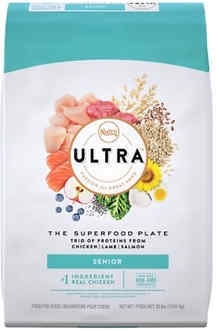
First Five Listed Ingredients: Chicken, Chicken Meal (source of Glucosamine and Chondroitin Sulfate), Whole Brown Rice, Brewers Rice, Rice Bran.
Nutro Ultra is a high quality dry dog food designed to suit senior dogs of all breeds and sizes.
It features farm-raised chicken, pasture-fed lamb and salmon as its three main proteins. These provide the protein that senior dogs need but not the extra fat that they do not.
Salmon also provides high levels of Omega 3 fatty acids, a substance that is important for a number of reasons. In fact for aging pups it can offer many clinically proven benefits including improving basic bone strength and joint function and health, potentially reducing their risk of osteoporosis and arthritis, improve eye health and help protect the liver.
In other words any good senior dog food should always include plenty of both Omega 3 and Omega 6 fatty acids. It has moderate levels of protein - 26.0% min crude proteins with 11.0% min crude fat, and a low calorie count of 316 kcal per cup.
In addition to these lean meat and fish ingredients Nutro Ultra Holistic Superfood Blend also features fruits and vegetables like berries and carrots and the formula is enhanced with additional Vitamin and mineral supplements including Vitamin D, Iron, Vitamin D and more, all of which are truly beneficial to any senior dog's health.
Fans of this food are delighted with the fact that their senior pups seem to enjoy the taste a great deal, even in cases where the pup has a reputation as a picky eater.
Some report feeling that their dog also seems to have more energy and was a little more mentally alert.
Overall the food gets great pet parent reviews and since it contains so many vet recommended ingredients for senior dogs certainly deserves 'top marks' here.
Best for Picky Eaters: Wellness CORE Senior Deboned Turkey Recipe
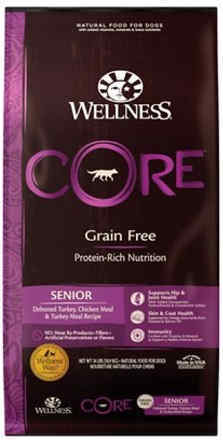
First Five Listed Ingredients: Deboned Turkey, Chicken Meal, Dried Ground Potatoes, Peas, Turkey Meal.
The primary ingredients in this senior dog food are deboned turkey and chicken meal. Although this may not sound as 'meaty' as the ingredients in the Nutro Ultra recipe, chicken meal actually contains up to four times the nutrients of fresh chicken so those 'nutritional bases' are well covered here, just in a slightly different way.
This is reflected in the analysis of the food, high protein levels of 32% are found and crude fats of 12% with a low-calorie level of 359 kcal per cup.
To provide those all-important Omega 3 and 6 fatty acids the formula features salmon oil and ground flaxseed, both excellent sources.
Flaxseed is important as it is a great source of an Omega 3 fatty acid known as DHA.
DHA is critical for brain and eye health at every age but in senior dogs it may also help slow the decline of brain function and the degeneration of sight.
Wellness CORE Senior Deboned Turkey Recipe is a grain free dog food, made in the USA and such formulas have been criticized for not containing enough taurine, a substance essential for maintaining senior canine heart health.
This formula however is enhanced with added taurine, something that reassured reviewers who were otherwise very pleased with the food that it was still a good choice for their older pup.
Best Premium Food: Orijen Senior Dry Dog Food
First Five Listed Ingredients: Fresh chicken meat (13%), fresh whole eggs (7%), fresh turkey meat (7%), fresh whole herring (7%), fresh chicken liver (6%).
This five star rated senior formula from Orijen is grain-free and carbohydrate limited which is particularly easy on an aging dog sensitive digestion.
85% of the ingredients found in this formula pertain to poultry, fish or eggs thus the high rates of quality protein and the remaining 15% of the recipe come from veggies, fruits and botanicals.
It is free of grains, tapioca, potato or other plant-based proteins and contains 435 kcal per 250ml/120g cup.
Glucosamine and Chondroitin are also added for joint mobility. Omega-3 Fatty Acids from wild caught fish will help keep your pup's skin and coat in top condition.
ORIJEN Senior is an AAFCO approved recipe for adult maintenance, which many aging dogs find it both highly palatable and nutritious. All of their ingredients are sustainably farmed or fished within Canada - so pet parents can rest assured of the quality of this dry kibble.
Also Popular: Blue Wilderness Rocky Mountain Recipe w/ Red Meat

First Five Listed Ingredients: Deboned Beef, Chicken Meal, Peas, Tapioca Starch, Pea Starch.
Not every dog is a fan of chicken and other fowl - as is the case for humans - some do prefer red meat. As long as the meat is lean and well- sourced in terms of ingredient quality that is not a problem at all, and that is the case when it comes to Blue Wilderness Red Meat for Senior Dogs - another great grain-free recipe for older dogs.
Although this is classified as a dry food for senior dogs it also contains something that Blue Wilderness calls 'Lifebits'.
These Lifebits - which feature in many of the Blue Mountain dog food formulas - are concentrated 'balls' (or bites, thus the name) of a blend of extra vitamins, minerals and antioxidants that, in this case supplements the nutrition already provided by the core ingredients themselves. It has 28% min. crude proteins, 12% crude fat and contains 383 kcal per cup.
Those core ingredients include deboned beef, lamb and venison.
Fish meal is included to provide a good source of Omega 3 fatty acids along with a number of fruits and vegetables including peas, sweet potatoes, blueberries and carrots. For those worried about a lack of taurine as is this is a low grain formula it is included in supplement form as a part of the Lifebits formula.
Fans of this senior dog food praise the quality of the ingredients and the taste and appeal of the Lifebits to their pups.
They also like the fact that Blue Wilderness Rocky Mountain Recipe contains no artificial colors, that its ingredients are from high quality sources and that almost across the board pups seem to enjoy the taste.
Best Canned Food for Senior Dogs: Nutro Ultra Senior Chunks in Gravy
First Five Listed Ingredients: Chicken Broth, Chicken (source of glucosamine and chondroitin sulfate), Chicken Liver, Potato Starch, Wheat Gluten.
Most adult dogs enjoy -and benefit from - a daily meal plan that includes both dry and wet dog food. Our top choice for wet food for senior dogs goes hand in hand with our number one choice for dry food for seniors, Nutro Ultra.
This wet dog food includes the same three major proteins as the dry offering - farm-raised chicken, pasture-fed lamb and salmon - as well as an extra bonus for senior dogs that may be experiencing - or prone to joint issues in the form of naturally sourced glucosamine and chondroitin.
There are substances that help keep joints healthy and flexible and they are often given in addition to food in supplement form by senior dog pet parents. Here however they are included within the formula itself.
Pet parents who have tried - and loved - this wet food for their senior pup praises its appealing texture and apparently appealing taste, the quality and the protein levels offered by the ingredients and the fact that Nutro Ultra Senior is gentle on the digestive system, something that some quality wet dog food products tend not to be.
Senior Dog Food Buying Guide and Tips
Our list of the best foods for older dogs is designed to help you begin to make the right choices when it comes to senior dog food but it does feature just a small handful of the products available that are now being marketed on the senior dog foods market.
There are many more and brand or ingredient preferences may lead some pet parents to look at other options as well.
Whatever brand(s) you do choose however there are some things you should be looking for in general in a good food for your aging pup. Here is a look at some of the most important of them.
Major Protein Sources
As dogs agree their metabolism usually slows and therefore they need fewer calories than they might have done as an adult and the calories they do consume really need to 'pack a nutritional punch' in every bite.
The best dog foods for seniors make use of meat and fish - aka proteins - that are lower in fat to help reduce calorie and fat count without reducing nutritional value.
These include lean meats - beef, chicken, turkey, duck and venison - and the higher the quality the leaner the meat usually is.
Higher protein quality is more important than higher protein content for senior dogs. The fact is that senior dogs do not need quite as much protein as they did when they were younger, and too much can actually put a strain on the kidneys of some senior dogs.
What do we mean by protein quality?
Protein quality means how well the amino acids in the protein are digested and absorbed by the body. The more easily they are absorbed and utilized the higher quality the protein.
As the senior dog's metabolism is slowing down this is even more important than ever.
These ingredients should also make up the majority of any senior dry dog food as the 'filler' found in some dog foods is just that, empty calories designed to make dogs feel fuller, and empty calories are the last thing a senior dog needs.
They should not be the only nutritional value ingredients though.
Look for a senior dog food that also contains plenty of antioxidant rich fruits and vegetables as well.
Good Sources of Omega 3 & Omega 6 Fatty Acids
If you remember back to our list of best dog food for aging dogs you will recall that we mentioned these antioxidant fatty acids a great deal, but that is for very good reason.
These 'good' fats have always been present in certain food sources - 'fatty fish' like salmon, sardines, flaxseed, soy beans, and more - but in recent years a number of research studies have been commissioned to study their benefits more closely, and those benefits it has been concluded are quite a few.
For dogs - and humans come to that matter - some of the demonstrated benefits have included bone and joint protection, eye health protection, brain health protection and even cutting the risk of heart disease. Therefore looking for a senior formulated dog food that contains adequate levels of omega 3 fatty acids is another must.
Dogs that are displaying any of the following conditions, notably dogs with skin conditions, are in need of supplementation.
Studies show the benefit of fish oil supplementation in controlling skin conditions in dogs.
- dry coat
- dry, itchy flaky skin
- poor nail quality
- joint stiffness/arthritis
The Question of Taurine
The subject of taurine in senior dog food - or the lack of it - has been another 'hot topic' over the past few years.
Taurine is an essential amino acid and it is found naturally throughout the body in some crucial tissues and systems that include the heart, the eyes and the brain.
The exact function of this amino acid is as of yet still unclear bit what has been proved is that a lack of it can be detrimental to the systems it is supposed to be found in.
Linda Case a dog trainer, canine nutritionist and science writer hones down as the importance of taurine in a dog's diet.
The following excerpts points out the possible risk factors for taurine-deficiency DCM in dogs.
Unlike the cat, dogs that are fed diets containing adequate levels of protein should be capable of synthesizing enough taurine from the two amino acid precursors, cysteine and methionine, to meet their needs. However, there is evidence – evidence that we have had for at least 15 years – that certain breeds of dogs, and possibly particular lines within breeds, exhibit a high prevalence of taurine-deficiency DCM. Genetically predisposed breeds include the American Cocker Spaniel, Golden Retriever, Labrador Retriever, Saint Bernard, Newfoundland and English Setter. A second factor that affects taurine status in dogs is size. There is evidence that a large adult size (e.g. Newfoundland) and a relatively slow metabolic rate influences the rate of taurine production in the body and may subsequently lead to a dietary taurine requirement. Ultimately, studies suggest that certain dogs possess a genetic predisposition to taurine depletion and increased susceptibility to taurine-deficiency DCM and that this susceptibility may be related to the combined factors of breed, size and metabolic rate.
When they are younger, most dogs produce enough taurine in their own bodies for it to be adequate for their needs without supplementation.
Often however, as they age the production of this amino acid decreases and many dogs do seem to benefit from being fed a dog food that is supplemented with additional taurine.
Weight Management
As dogs slow down it is almost inevitable that they become more prone to weight gain.
Often trying to encourage additional exercise as a weight management tool is not an option as many senior dogs are just no longer up to huge amounts of exercise and so pet parents must look to their senior dog’s food as a weight management tool instead.
This should not involve depriving a pup and leaving him hungry or unsatisfied though.
It should involve taking a closer look at the ingredients and make-up of the various senior dog food under consideration and choosing one that is lower in calories per serving than their previous adult food but still offers the nutrition they need.
Supplements for Older Dogs
Humans are increasingly turning to supplements to boost their health and some pet parents wonder if doing so will be beneficial for their dogs as well, especially if that dog is a senior one.
Most vets and pet health experts see little harm in some supplements, especially glucosamine and chondroitin for joint and cartilage health, various antioxidants like vitamins C, D and E and of course Omega fatty acids.
However, most of them also then say that it is preferable that senior dogs get the levels of these substances that they need from their everyday diet instead and if they do then supplementation will not be necessary.
If you want to determine the best Omega 3 supplementing oil, do the styrofoam cup test on your choice of “fish oil” capsule.
Styrofoam Cup Test
1. Squirt a capsule of your fish oil into a styrofoam cup sitting on a plate.
2. Leave for 10 minutes.
3. Ethyl ester fish oils will eat right through the cup. Natural triglyceride fish oils will only show minor leakage after 2 to 3 hours.
Ethyl ester fish oils are poorer absorbed by the body. Natural triglyceride fish oils is best absorbed but it will be lowest in good bits as it contains “everything".
Overall we recommend supplementing your aging dog with a krill oil like the Zesty Paws Omega-3 Krill Oil, another fish-body oil or Algal DHA to supply your dog with a good source of omega-3’s.
All of the foods we included on our list of best dog foods for senior dogs are created with those needs in mind, even if sometimes pet parents do not equate the presence of certain ingredients with an actual nutritional purpose.
Some pet parents, for example, fail to understand why berries like blueberries and cranberries - along with apples and carrots - are included prominently in many high quality senior dog foods.
These however are all excellent sources of antioxidants, including the essential to overall health vitamins like A, C and D.
Glucosamine and chondroitin is a slightly different matter. In some dogs suffering from joint mobility and joint pain problems glucosamine and chondroitin supplements have been shown to have almost life changing effects in terms of a reduction in apparent pain and stiffness and a restoration of a certain range of mobility.
And while some (but not most) dog foods do contain glucosamine and chondroitin some senior dogs may indeed benefit from an extra supplement as well like Cosequin, the number one veterinarian- recommended supplement for joint health.

A good supplement can help support both bone and joint health of your dog. (Source: Boneo)
Your Vet and Your Senior Dog
The best way to decide whether you should be giving your senior dog extra supplements is to discuss the issue with your vet. Which brings us to another point.
As your dog ages many of the conditions he may become susceptible to can be well treated, but in many instances only if they are detected early enough.
This is why making use of the services of a trusted vet - one who is allowed the time to 'get to know' your aging pup becomes so important.
This does not mean that your pup has to head to the vets every month, but increasing even a healthy senior dog's check up schedule from once a year to once every six months is always a good idea as they age.
And never be afraid to ask your vet for their opinion and advice on anything that seems to be changing as your dog gets older, however small.
Aging Dogs, A Final Word
As is the case with humans, the outlook for enjoying a good quality of life well into their senior years is improving for dogs of all kinds.
With the right care, attention and lifestyle changes - especially when it comes to their everyday nutrition and feeding - every dog has a better chance of leading a happy, healthy life longer and even when they do finally 'slow down' to the point where they are no longer as active they can still enjoy their final years with their human family and their human family can do the same with them.
***
Which senior dog food does your old friend enjoy? Let us know in the comments below!




